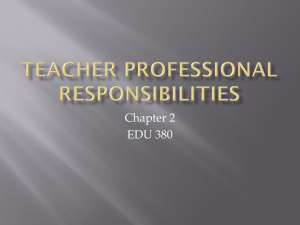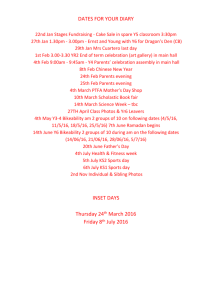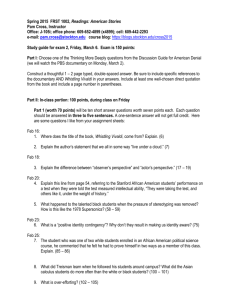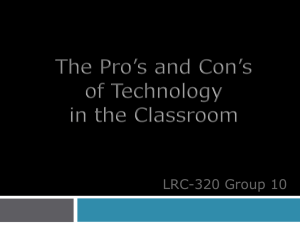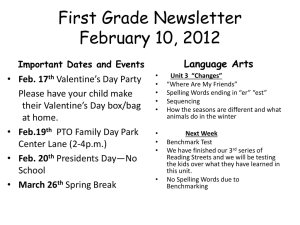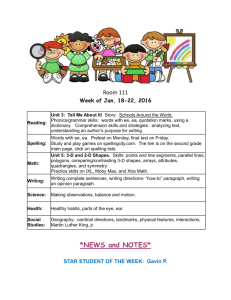Solar-System-Research
advertisement
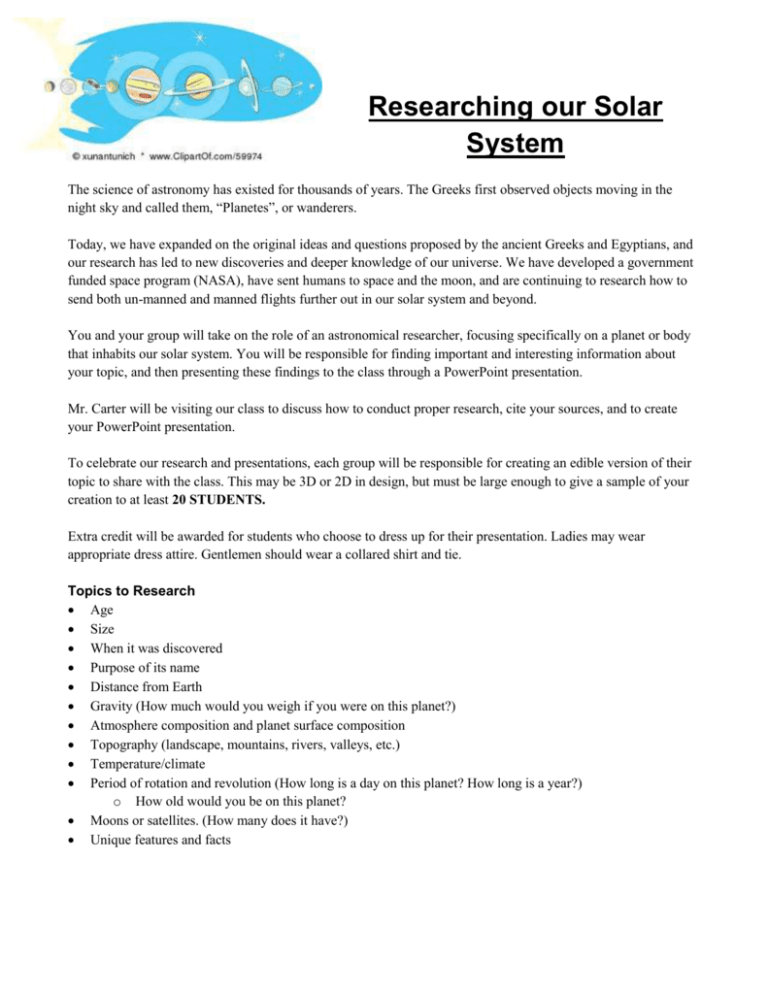
Researching our Solar System The science of astronomy has existed for thousands of years. The Greeks first observed objects moving in the night sky and called them, “Planetes”, or wanderers. Today, we have expanded on the original ideas and questions proposed by the ancient Greeks and Egyptians, and our research has led to new discoveries and deeper knowledge of our universe. We have developed a government funded space program (NASA), have sent humans to space and the moon, and are continuing to research how to send both un-manned and manned flights further out in our solar system and beyond. You and your group will take on the role of an astronomical researcher, focusing specifically on a planet or body that inhabits our solar system. You will be responsible for finding important and interesting information about your topic, and then presenting these findings to the class through a PowerPoint presentation. Mr. Carter will be visiting our class to discuss how to conduct proper research, cite your sources, and to create your PowerPoint presentation. To celebrate our research and presentations, each group will be responsible for creating an edible version of their topic to share with the class. This may be 3D or 2D in design, but must be large enough to give a sample of your creation to at least 20 STUDENTS. Extra credit will be awarded for students who choose to dress up for their presentation. Ladies may wear appropriate dress attire. Gentlemen should wear a collared shirt and tie. Topics to Research Age Size When it was discovered Purpose of its name Distance from Earth Gravity (How much would you weigh if you were on this planet?) Atmosphere composition and planet surface composition Topography (landscape, mountains, rivers, valleys, etc.) Temperature/climate Period of rotation and revolution (How long is a day on this planet? How long is a year?) o How old would you be on this planet? Moons or satellites. (How many does it have?) Unique features and facts Resources Mr. Carter has pulled a variety of resource books for you to use. These will be available for both 8th grade science classes. In addition to these books, you may also use your textbook. There are several sections that discuss the solar system, planets, and our sun. YOU MUST USE AT LEAST 1 BOOK RESOURCE FOR YOUR PROJECT! Below I have provided several good websites to help get you started. Nasa.gov Solarsystem.nasa.gov Nineplanets.org Sciencenews.org Discovermagazine.com Popsci.com We will be using our iPads to conduct the majority of our research. You may use the app “Solar System” as well as Safari web browser. YOU MUST USE AT LEAST 2 DIGITAL RESOURCES FOR YOUR PROJECT! How you will be graded. You will be graded both individually and as a group. Your group grade will be based on providing all of the required information in your presentation to class. You will be expected to cite your sources properly, and explain your research fully. Your individual grade will be based upon each person in your group speaking. Each group member will be responsible for presenting two slides of information to the class. You will be expected to expand on points outlined on your PowerPoint. DO NOT READ FROM YOUR SLIDES COMPLETELY. Good Luck!! To Infinity and Beyond!! Rubric Meets (15 – 17 pts.) Topic Exceeds (18 – 20 pts.) Background/Basic Information Students present their research with a clear and accurate understanding of the planet, and they include 11 or 12 of the topics to research. Students have no significant errors in the facts presented. The slide show is well organized and flows smoothly from one topic to the next. There is a logical sequence of slides. Students present their research in a visually appealing way and include several different types of images including pictures, graphs, and diagrams that relate to and enhance the content. Students include all information and format citations correctly. Students present their research with a basic understanding of the planet, and they include 810 of the topics to research. Students may have a few errors in the facts presented. Students do not present accurate information about their planet. They include less than 8 of the topics to research. Students have several errors in the facts presented. The slide show is organized and flows from one topic to the next. There is a basic sequence of slides. Students present their research in a visually appealing way and include a few different types of images including pictures, graphs, and diagrams that are related to the content. The slide show is not organized and does not flow from one topic to the next. There is no sequence of slides. Students do not present their research in a visually appealing w ay. The images are irrelevant or inaccurate. Students make few errors in citation. Students do not format citations correctly. Students do not provide all information for citations. Exceeds (18 – 20 pts.) Meets (15 – 17 pts.) Does Not Meet (10 – 15 pts.) Student demonstrates a basic understanding of the subject. The student shows some preparedness and enthusiasm. Student does not demonstrate knowledge or an understanding of the content. Student does not show preparedness and enthusiasm. Organization of Presentation Visual Appeal (Images) Works Cited Individual Grade Presentation Student demonstrates clear and detailed understanding of the subject and presents it in an organized manner. Student shows preparedness and enthusiasm in their presentation. Student speaks clearly and elaborates on slide information Group Member___________________________ Grade: /100 Does not Meet (10 – 15 pts.) TIMELINE Monday Feb. 4 Tuesday Feb. 5 Wednesday Feb. 6 Thursday Feb. 7 Friday Feb. 8 RESEARCH RESEARCH RESEARCH RESEARCH RESEARCH Monday Feb. 11 Tuesday Feb. 12 Thursday Feb. 14 Friday Feb. 15 POWERPOINT POWERPOINT Wednesday Feb. 13 HALF-DAY POWERPOINT POWERPOINT POWERPOINT Monday Feb. 18 Tuesday Feb. 19 Wednesday Feb. 20 Thursday Feb. 21 Friday Feb. 22 NO SCHOOL PRESENTATIONS PRESENTATIONS CELEBRATION PRESENTATIONS

